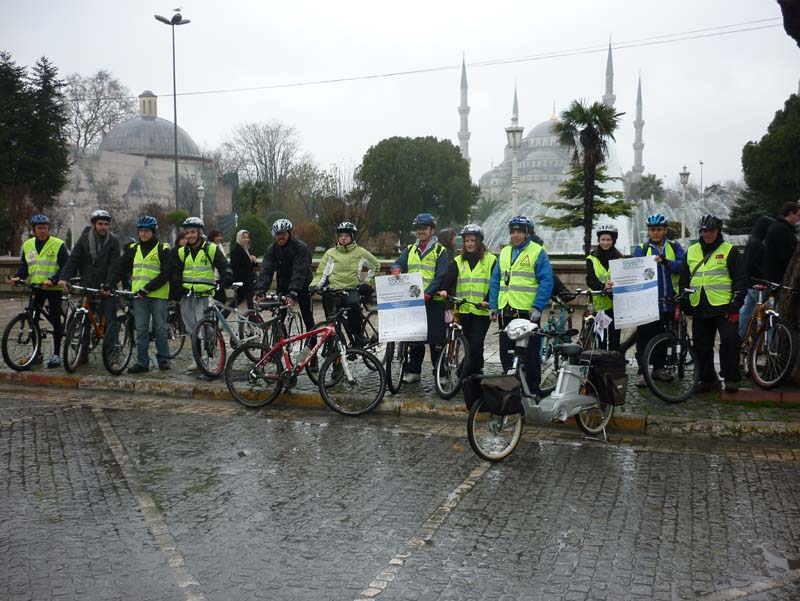 Today my piece about Murat Suyabatmaz and his intrepid cycling friends in Istanbul was posted on sfgate. Check it out: Istanbul and Bicycling, Like Dark Bread It’s Good For Everyone
Today my piece about Murat Suyabatmaz and his intrepid cycling friends in Istanbul was posted on sfgate. Check it out: Istanbul and Bicycling, Like Dark Bread It’s Good For Everyone
It has excerpts from an interview I did with Murat last December, so I thought for those who’d like to read the whole interview, I’d post it here. To refresh your memories, revisit the entry Pedal Magic on the Bosphorus (a photo essay from rainy Istanbul) that I posted right after our magical cycling tour through Istanbul.
Interview with Murat Suyabatmaz, translated by Cetin Yurtsever
Ecocity World Summit, Istanbul, Turkey
December 12, 2009
Sven: What inspired you to start Türkiye Bisikletliler Derneği (Turkish Bicycle Association)
Murat: We started our first bicycle association called Bisikletsevenler (bicycle lover) in 1999, but two years ago we founded Bisikletliler (bicyclist), which is much larger and a member of the European Cyclists Federation. Our goal is to get more bike routes and the kind of bicycle culture you find in other European and American cities, because we want a healthier environment and reduce carbon dioxide emissions. Educating people about the economic benefits of riding your bike and teaching children how to ride in traffic are important parts of our mission. Also, we want to promote bicycle tourism, not only in old town Istanbul and around the Bosphorus but through green lanes out of Istanbul and all around Turkey. We also believe that the bicycle is an important means of transportation in the aftermath of an earthquake.
Sven: You’ve had Mr. Veysel Eroglu, Turkish Minister of Environment and Forestry, and other officials come on bike tours with you, getting the highest levels of government involved. What are some of the projects you have proposed to them?
Murat: We are working on a project with the United Nations in the town of Izmit, about 100km east of Istanbul. The first phase is an educational campaign called “Let children go to school by bike” and has already begun. The second phase will be to designate special roads for kids to learn how to ride a bike and traffic laws. Next, we will coordinate with the local municipality to create an integrated system of bike lanes. There really are too many projects to count. We’re not only improving transportation, but we’re involved in issues of ecology, health, education, and tourism. We already have 20 branches of Bisikletliler all over Turkey, and all of them are working on their own local projects. We share our experience and know-how from Istanbul, as well as all the things we’ve learned from Europe and the U.S. For example, tonight I’m leaving for Antalya, aka the Paradise Area (a beach city on the Mediterranean coast of Southwestern Turkey), where I will share our know-how with the local branch of Bisikletliler and the municipal authorities.
Sven: How do you get started in cities that don’t have a bicycle infrastructure and are new to the idea of the bike as a commuter vehicle?
Murat: We first look for local people who are enthusiastic about cycling and bike culture and want to take a leadership role in organizing a group. We show them how to get started in promoting the bicycle in their town. Then we help them formulate what they want to accomplish and who to talk to in their local municipality to make it happen.
Sven: The opportunities and challenges are very similar whether you’re in the U.S, Germany, or Turkey. No matter where you are, it seems that networking and talking to people about the advantages of biking is one of the most effective tools available to bike advocates around the world…
Murat: Yes, absolutely. That’s why our biggest campaign this year will be to promote bicycle life and culture all around Turkey. This campaign will emphasize not only the economic and environmental but the practical benefits of riding your bike. The message is that the bicycle is the right vehicle to get around on. It’s like bread: We used to eat nutritious dark bread that was baked fresh and locally every morning. Then, about 30 years ago, everyone started to buy and eat cheap white bread. We’re just now realizing that the dark bread is not only much healthier but tastes better, and people are willing to spend a little extra money again to eat right. The bicycle is like dark bread, it’s making a comeback in Turkey for the same reason: It’s good for everyone.
Sven: Beautiful analogy. One last question: Anything you would like to say to the people of the San Francisco Bicycle Coalition?
Murat: We’re very grateful to the cyclists of San Francisco. We like how they have organized a mass movement and set an example for us to follow. During our ecology week next June we will do a bike tour across the Bosphorus bridge that connects Europe and Asia, and we would like to invite any members of the San Francisco Bicycle Coalition to come and join us for the occasion.
Sven: Thank you very much.








Congratulations, Sven! May your healing ideas and words continue to spread to many other publications.
And, have you thought of an article about transportation for the elderly and disabled who wouldn’t be able to use bicycles?
Pam B
I haven’t yet, but I’m thinking that the more we work on getting wider sidewalks and separate bike lanes, the better we’ll be able to integrate space for electric carts and other small vehicles as well that can be used by the elderly and disabled. For example they just took out a lane for cars and widened the sidewalks on Valencia St, the main business drag in my neighborhood, so now there’s plenty of room for pedestrians and small scooters to coexist. This is an important point you raise, and it needs to be integrated in urban design as we make our cities less car dependent and more livable.
Speaking of which, I heard a very interesting interview on NPR yesterday with professor Monica Ponce de Leon, dean of the School of Architecture and Urban Planning at the University of Michigan, about changes in architecture and design 20 years after the passage of the Americans with Disabilities Act. She had some fascinating design ideas that might make “handicap” spaces obsolete in the future. Check it out:
http://www.npr.org/templates/story/story.php?storyId=128778558&ft=1&f=2
After visiting Istanbul I have a new found appreciation for what it takes to create a bike culture there. Hats off to Murat for imagining a sustainable future in spite of some real challenges. And congrats to you for spreading the word far and wide!
Yes, Murat is one of those people just brimming with faith in their mission that you just can’t refuse them. And that’s what’s happening, they’re conquering Istanbul’s congestion problem one minister and street at a time.